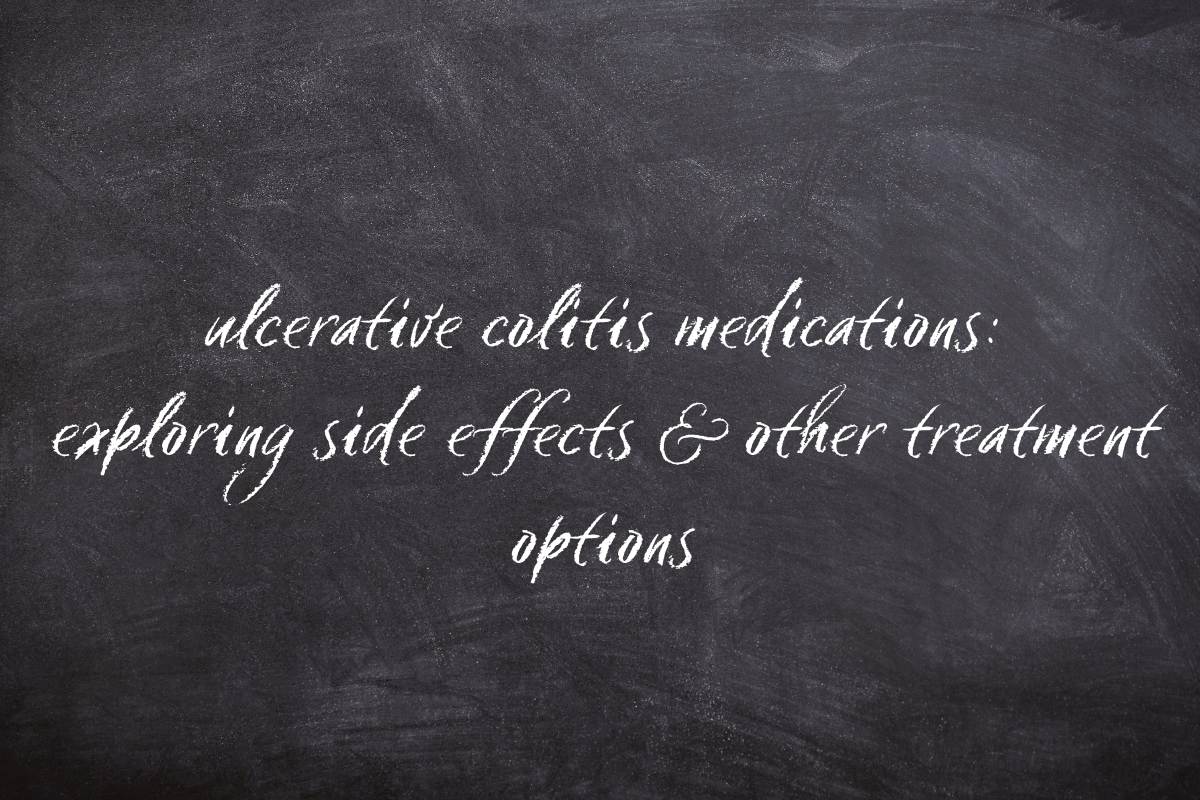Living with ulcerative colitis can be a challenging journey, especially when medications sometimes bring unintended side effects. If you’re managing ulcerative colitis symptoms or exploring ulcerative colitis medications as part of your treatment, understanding the options and potential side effects is crucial.
Here, I’ll share my insight into the ups and downs of colitis treatments and share personal experiences on how to manage flare-ups while seeking a balanced approach to care.

What Is Ulcerative Colitis?
Ulcerative colitis is a type of inflammatory bowel disease (IBD) that causes inflammation in the colon and rectum. This chronic illness leads to painful bowel disease symptoms, including abdominal pain, urgency, and rectal bleeding.
In severe cases, ulcerative colitis may result in the need for specialized surgical procedures like ileal pouch anal anastomosis. Treatment options vary based on disease severity, ranging from mild to moderate ulcerative colitis to severe ulcerative colitis.
Common Medications to Treat Crohn’s Disease and Ulcerative Colitis
The Mayo Clinic recommends several types of ulcerative colitis medications aimed at reducing inflammation and managing symptoms.
Here’s a quick overview of the primary medication types:
- Aminosalicylates (5-ASA) – These anti-inflammatory drugs help treat mild to moderate cases by reducing inflammation directly in the colon. However, they can sometimes cause side effects, such as gastrointestinal distress.
- Corticosteroids – Generally used for moderate ulcerative colitis to quickly reduce inflammation, steroids are effective but typically prescribed only for short-term use due to their potential side effects.
- Immunosuppressants – These medications work by calming down the immune system to prevent it from attacking the colon, which can be particularly beneficial in severe cases. Immunosuppressants come with potential risks, including lower red blood cells and increased vulnerability to infections.
- Biologics and JAK Inhibitors – Newer treatments, including JAK inhibitors, target specific immune responses. Biologics are often used when other medications haven’t been effective and have shown promise in helping patients achieve remission. But it is important to
- NSAIDs – Though sometimes used to control inflammation, certain NSAIDs can aggravate the gastrointestinal tract. For example, I was prescribed Balsalazide, an NSAID that initially worked well for my ulcerative colitis symptoms but eventually contributed to stomach ulcers despite the fact that my doctor perscribed it to me for the sole purpose of treating ulcers.

My Experience with Balsalazide and a Flare-Up on Christmas
The day started off promising enough: I came downstairs, settled in to watch my daughter open her gifts, and just as she unwrapped her second present, I felt that all-too-familiar wave of sickness. A dizzy rush to the bathroom later, I was met with bright red blood and a fair dose of queasiness. I made it back to the couch, hoping I was in the clear—only to repeat this routine about five more times in the next hour. That last time, I noticed the blood wasn’t its usual red, but black, which was more than a little concerning. Black blood is a sign that the bleeding isn’t just from the colon but higher up in the digestive tract. Somehow, the next trip finally brought relief, and I managed to enjoy the rest of the holiday without further stomach antics (no food, but hey, you take what you can get).
The following day, things were looking up; I could snack lightly, and the dreaded flare-up seemed to be winding down. But that night, I woke up with a sharp pain dead center in my stomach—like a hot knife every time I moved. I started doing some sleuthing and realized that the Balsalazide I’d been prescribed—an NSAID (Non-Steroidal Anti-Inflammatory Drug)—might be the culprit. It turns out NSAIDs, which were prescribed to me for ulcers, are known to cause stomach ulcers. And here I was, now sporting a set of ulcers in both my colon and my stomach.
By Monday, I’d had enough and called my gastroenterologist. They prescribed a proton pump inhibitor, designed to help reduce stomach acid and ease ulcer pain. I mentioned my suspicion that Balsalazide might be the problem, but they didn’t seem too fussed. It almost felt like they were prescribing pills to counter the effects of other pills—talk about job security.
But hey, they are the doctors, they know what’s best, right? So, I started the new med, took a break from the Balsalazide, and hoped for a miracle.
And then, like clockwork, I woke up with a “fountain of blood” kind of morning. Not only was my stomach bleeding, but so was my colon, all because I’d missed a few doses. So here I am, back on both meds and feeling a bit like a pharmaceutical guinea pig. I can’t help but wonder if this is just part of the journey, or is there a better way to manage this ulcerative colitis beast without collecting new ulcers along the way?
Exploring Alternative and Dietary Treatments
While my medication has played a role in my treatment, I also follow the Specific Carbohydrate Diet (SCD), a popular dietary approach for inflammatory bowel disease management. Many believe that dietary adjustments can promote gut health and reduce inflammation over time. Despite the challenges, I’ve noticed improvements, though I remain cautious about attributing these to either the diet or the medication alone.
Resources and Support for Ulcerative Colitis Patients
Navigating ulcerative colitis can feel overwhelming, but there are several trusted resources and communities that provide information and support:
- Mayo Clinic Inflammatory Bowel Disease Clinic and the Crohn’s & Colitis Foundation offer in-depth information on ulcerative colitis treatments, symptom management, and research updates.
- Online support groups, including those on Facebook, offer firsthand insights and emotional support from people with similar experiences.
- Staying informed on new treatments, clinical trials, and medications to treat ulcerative colitis that the FDA approves.
What is the first drug of choice for ulcerative colitis?
Aminosalicylates, often referred to as 5-ASAs, are anti-inflammatory drugs that help heal damaged tissue. These medications are commonly used as a primary treatment for mild to moderate cases of ulcerative colitis, aiming to control inflammation and promote remission.
Aminosalicylic acid is an aminosalicylate drug used to induce remission in ulcerative colitis.
What is the best alternative treatment to using medications to treat Inflammatory bowel disease?
With the variety of symptoms and severity of illness comes many treatrment options for Ulcerative Colitis and other Inflammatory bowel disease available. Although when someone asks me personally what I would suggest, I always reccomend that they look into the Specific Carbohydrate Diet.
How do you calm a colitis flare-up?
When managing an ulcerative colitis flare-up, these steps may help.
- Stay hydrated by drinking plenty of fluids, and use gentle methods to soothe irritated skin and discomfort.
- Opt for easy-to-digest foods, and plan ahead by identifying restroom locations when you’re out.
- Keep your doctor informed, simplify your medication routine, and consider anti-diarrheal medications if needed.
- Lastly, don’t hesitate to seek support from friends or join a support group for added encouragement.
When should I call my doctor about Ulcerative Colitis?
If you experience any concerning symptoms while on ulcerative colitis medication, such as increased bleeding, severe pain, or dark blood in the stool, it’s important to reach out to your healthcare provider. Blood tests, a barium enema, colon cancer screening, or other evaluations may be necessary to understand the source of the bleeding and whether medication adjustments are needed.
For those who experience flare-ups while on medications like Balsalazide or other colitis medications, it’s worth discussing options for inflammatory bowel diseases. If you are experiencing an ulcerative colitis flare while on medication it is important to review your overall treatment plan. Keep in mind that treatments are personalized, and there are often multiple paths to managing bowel disease and maintaining remission.
What are the 4 stages of ulcerative colitis?
Ulcerative colitis (UC) is assessed by stages, which include its activity (active, remission), the extent of inflammation (proctitis, left-sided colitis, pancolitis, distal colitis), and severity (mild, moderate, severe). Each stage guides treatment, with tailored options for maintenance therapy or active management.
What is the ultimate cure for ulcerative colitis?
The only definitive so-called cure for ulcerative colitis is a surgical procedure that removes the colon and rectal lining. The most common surgery type allows for continued bowel movements with a connection, known as ileoanal anastomosis, to the small intestine. In some cases, patients may use an ostomy bag to manage waste post-surgery. Even with this surgery, patients may experience flare-ups in other parts of the body.
Final Thoughts on Ulcerative Colitis Medications and Treatment
If you or a loved one is managing ulcerative colitis, remember that a treatment plan is not one-size-fits-all. Whether you rely on medications, dietary changes, or a combination, working closely with a healthcare provider and staying informed is key. Ulcerative colitis symptoms and flares may change over time, so keep the lines of communication open with your medical team, and don’t hesitate to seek second opinions if something doesn’t feel right.
By understanding the available ulcerative colitis treatment options and their potential impacts, you’re better equipped to make decisions that support your health and quality of life.
For more on this topic, read about how I was diagnosed with ulcerative colitis which eventually led me to a diagnosis of something called toxic megacolon.
About Thirty Something Super Mom

My journey started after a Crohn's disease diagnosis, inspiring a commitment to well-being. This site shares my distinctive approach to healthy living with my collection of nutritious recipes that boast authentic flavors, mimicking the indulgence of traditional dishes. I love sharing guilt free recipes for low carb, keto, gluten-free, paleo, and the specific carbohydrate diet. I also share tips on natural living, including homemade cleaners and cleaning hacks. I also share my experience as a veterinary technician and pet groomer, to integrate pet health tips, homemade dog food recipes, and grooming insights to ensure your pets thrive.
